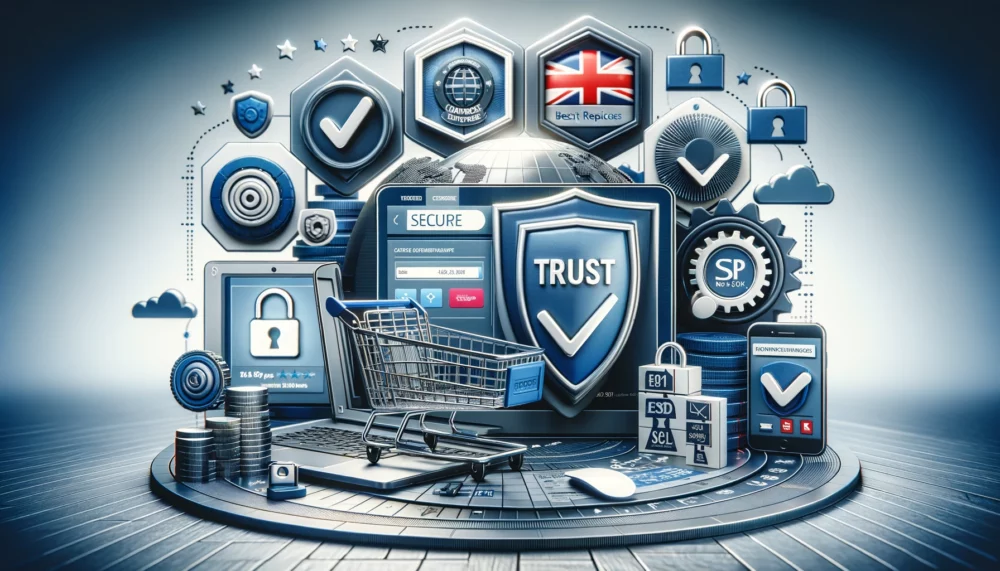Table of Contents Introduction The Importance of a Clear and Concise Headline Crafting Compelling Call-to-Action…

“Building Trust Online: Essential Elements for an E-commerce Website”
-
Table of Contents
- Introduction
- The Importance of Transparent Product Descriptions and Pricing
- Establishing Credibility through Customer Reviews and Testimonials
- Building Trust with Secure Payment Options and Data Protection
- Enhancing User Experience with Clear and Easy-to-Navigate Website Design
- Implementing Trust Seals and Certifications to Assure Customers
- Effective Communication and Prompt Customer Support for Trust Building
- Conclusion
“Building Trust Online: Essential Elements for an E-commerce Website” – Establishing credibility and confidence in every click.
Introduction
Building Trust Online: Essential Elements for an E-commerce Website
In today’s digital age, trust is a crucial factor for the success of any e-commerce website. With countless options available to consumers, building trust online has become essential to attract and retain customers. Establishing trust not only enhances the credibility of an e-commerce website but also encourages customers to make purchases and share their positive experiences with others. This article will explore the essential elements that contribute to building trust online for an e-commerce website, helping businesses create a secure and reliable platform for their customers.
The Importance of Transparent Product Descriptions and Pricing
Building Trust Online: Essential Elements for an E-commerce Website
In the world of e-commerce, building trust with your customers is crucial. With so many options available to consumers, it’s important to establish credibility and transparency to stand out from the competition. One of the key elements in building trust online is providing transparent product descriptions and pricing.
When customers visit an e-commerce website, they want to know exactly what they are getting. Clear and detailed product descriptions are essential in helping customers make informed purchasing decisions. By providing accurate information about the product’s features, specifications, and benefits, you are showing your customers that you value their time and money.
Transparency is also crucial when it comes to pricing. Customers want to know the exact cost of a product, including any additional fees or charges. Hidden costs can lead to frustration and distrust, ultimately driving customers away from your website. By clearly displaying the price of each product, along with any applicable taxes or shipping fees, you are demonstrating transparency and honesty.
Another important aspect of transparent pricing is offering competitive prices. Customers are savvy shoppers, and they will compare prices across different websites before making a purchase. If your prices are significantly higher than your competitors, customers may question the value they are getting from your products. On the other hand, if your prices are too low, customers may question the quality of your products. Striking the right balance and offering competitive prices will help build trust and attract customers to your e-commerce website.
In addition to transparent product descriptions and pricing, it’s important to provide customers with easy access to customer reviews and ratings. Customers rely heavily on the opinions and experiences of others when making purchasing decisions. By including customer reviews and ratings on your website, you are providing social proof and building trust. Positive reviews and high ratings can reassure potential customers that your products are of high quality and worth purchasing.
Furthermore, it’s important to address any potential concerns or questions that customers may have. Providing a comprehensive FAQ section or a dedicated customer support team can help alleviate any doubts or uncertainties. By being proactive in addressing customer concerns, you are showing that you value their satisfaction and are committed to providing a positive shopping experience.
Lastly, it’s crucial to have a secure and reliable payment system in place. Customers need to feel confident that their personal and financial information is protected when making a purchase on your website. Implementing secure payment gateways and displaying trust seals can help reassure customers that their information is safe. Additionally, offering multiple payment options can cater to different customer preferences and increase convenience.
In conclusion, transparent product descriptions and pricing are essential elements in building trust on an e-commerce website. By providing accurate and detailed information about your products, offering competitive prices, and displaying customer reviews and ratings, you can establish credibility and attract customers. Addressing customer concerns and ensuring a secure payment system further enhances trust and confidence. By prioritizing transparency and trustworthiness, you can differentiate your e-commerce website and build long-lasting relationships with your customers.
Establishing Credibility through Customer Reviews and Testimonials
In the world of e-commerce, building trust with potential customers is crucial for the success of any online business. With so many options available to consumers, it is essential for e-commerce websites to establish credibility and gain the trust of their target audience. One effective way to achieve this is through customer reviews and testimonials.
Customer reviews and testimonials serve as social proof, providing potential customers with insights into the experiences of others who have already purchased products or services from a particular e-commerce website. These reviews and testimonials can help build trust by showcasing the positive experiences of satisfied customers.
When it comes to customer reviews, authenticity is key. Customers are more likely to trust reviews that appear genuine and unbiased. E-commerce websites should encourage customers to leave honest reviews, whether positive or negative, and avoid any attempts to manipulate or censor them. Transparency is crucial in building trust, and potential customers will appreciate the honesty and authenticity of genuine customer reviews.
To further establish credibility, e-commerce websites can also include testimonials from satisfied customers. Testimonials are more detailed accounts of customers’ experiences and can provide potential customers with a deeper understanding of the benefits and value of a product or service. Including testimonials from real customers who have had positive experiences can help build trust and confidence in the e-commerce website.
In addition to authenticity, the quantity and quality of customer reviews and testimonials also play a significant role in building trust. E-commerce websites should strive to gather a substantial number of reviews and testimonials to demonstrate that their products or services have been tried and tested by many satisfied customers. The more positive reviews and testimonials a website has, the more likely potential customers will trust the brand and make a purchase.
To ensure the quality of customer reviews and testimonials, e-commerce websites can implement a review moderation system. This system allows the website to filter out any inappropriate or spammy reviews, ensuring that only genuine and relevant feedback is displayed. By maintaining a high standard for customer reviews and testimonials, e-commerce websites can further enhance their credibility and trustworthiness.
It is also important for e-commerce websites to respond to customer reviews and testimonials promptly. This shows that the website values customer feedback and is committed to addressing any concerns or issues raised by customers. Responding to reviews, whether positive or negative, demonstrates transparency and a willingness to engage with customers, further strengthening the trust between the website and its potential customers.
In conclusion, customer reviews and testimonials are essential elements for building trust on an e-commerce website. By encouraging genuine and unbiased reviews, including detailed testimonials, and maintaining a high standard for quality, e-commerce websites can establish credibility and gain the trust of potential customers. Responding to customer feedback promptly and transparently also plays a crucial role in building trust. Ultimately, by leveraging the power of customer reviews and testimonials, e-commerce websites can create a trustworthy and reliable online presence, attracting more customers and driving business growth.
Building Trust with Secure Payment Options and Data Protection
Building Trust with Secure Payment Options and Data Protection
In the world of e-commerce, building trust with customers is crucial for the success of any online business. With the increasing number of cyber threats and data breaches, customers are becoming more cautious about sharing their personal and financial information online. Therefore, it is essential for e-commerce websites to prioritize secure payment options and data protection to instill confidence in their customers.
One of the most effective ways to build trust with customers is by offering secure payment options. Customers want to feel confident that their financial information is safe when making online purchases. Therefore, it is important for e-commerce websites to offer a variety of secure payment methods, such as credit cards, PayPal, or other trusted third-party payment processors. By providing multiple options, customers can choose the method they feel most comfortable with, increasing their trust in the website.
Furthermore, it is crucial for e-commerce websites to clearly communicate their security measures to customers. This can be done by prominently displaying security badges or logos on the website, indicating that the website is secure and trustworthy. Additionally, providing detailed information about the encryption methods used to protect customer data can further reassure customers about the safety of their information.
Another essential element for building trust online is data protection. Customers want to know that their personal information is being handled responsibly and will not be misused or shared with third parties without their consent. E-commerce websites should have a clear and transparent privacy policy that outlines how customer data is collected, stored, and used. This policy should be easily accessible and written in plain language to ensure that customers can understand it.
To further enhance data protection, e-commerce websites should invest in robust security measures. This includes implementing secure socket layer (SSL) certificates, which encrypt data transmitted between the website and the customer’s browser. SSL certificates not only protect customer data from being intercepted by hackers but also provide visual cues, such as a padlock icon or a green address bar, indicating that the website is secure.
Regular security audits and vulnerability assessments are also essential to ensure that the website’s security measures are up to date and effective. By regularly testing for vulnerabilities and addressing any weaknesses, e-commerce websites can demonstrate their commitment to protecting customer data and building trust.
In addition to secure payment options and data protection, e-commerce websites should also prioritize customer support. Promptly addressing customer concerns and providing assistance when needed can go a long way in building trust. This includes offering multiple channels for customer support, such as live chat, email, or phone, and ensuring that responses are timely and helpful.
In conclusion, building trust with customers is crucial for the success of any e-commerce website. By prioritizing secure payment options and data protection, e-commerce websites can instill confidence in their customers and encourage them to make online purchases. Offering a variety of secure payment methods, clearly communicating security measures, and implementing robust data protection measures are essential elements for building trust online. Additionally, providing excellent customer support further enhances trust and ensures a positive shopping experience. By focusing on these essential elements, e-commerce websites can establish themselves as trustworthy and reliable platforms in the competitive online marketplace.
Enhancing User Experience with Clear and Easy-to-Navigate Website Design
In today’s digital age, e-commerce has become an integral part of our lives. With the convenience of online shopping, more and more businesses are venturing into the world of e-commerce. However, with the increasing number of online stores, it is crucial for businesses to stand out from the competition and build trust with their customers. One of the essential elements for an e-commerce website to establish trust is a clear and easy-to-navigate website design.
When it comes to online shopping, user experience plays a significant role in building trust. A well-designed website that is easy to navigate enhances the user experience and makes it more likely for customers to trust the brand. A cluttered and confusing website, on the other hand, can lead to frustration and a lack of trust in the business.
To enhance user experience, it is important to have a clean and organized layout. The website should have a clear and visually appealing design that is easy on the eyes. The use of white space can help create a sense of balance and make the content more readable. Additionally, the use of high-quality images and videos can engage users and make the website more visually appealing.
Navigation is another crucial aspect of website design. Users should be able to find what they are looking for quickly and easily. A clear and intuitive navigation menu that is prominently displayed on the website can help users navigate through different sections and find the products or information they need. It is also important to have a search bar that allows users to search for specific products or keywords.
Furthermore, it is essential to have a responsive design that adapts to different devices and screen sizes. With the increasing use of smartphones and tablets for online shopping, it is crucial for e-commerce websites to be mobile-friendly. A responsive design ensures that the website looks and functions well on all devices, providing a seamless user experience.
In addition to a clear and easy-to-navigate design, it is important to provide relevant and useful content. The website should have clear product descriptions, pricing information, and shipping details. Customers should be able to easily understand what they are purchasing and what to expect in terms of delivery and returns. Providing detailed and accurate information builds trust and helps customers make informed decisions.
Another element that can enhance user experience is the inclusion of customer reviews and ratings. Customers often rely on the experiences of others when making purchasing decisions. By including customer reviews and ratings on the website, businesses can build trust and credibility. It also provides valuable feedback for the business to improve its products and services.
In conclusion, a clear and easy-to-navigate website design is essential for building trust in an e-commerce website. A well-designed website enhances the user experience and makes it more likely for customers to trust the brand. By focusing on a clean and organized layout, intuitive navigation, responsive design, relevant content, and customer reviews, businesses can create a website that instills confidence in their customers. In the competitive world of e-commerce, building trust is crucial for success, and a clear and easy-to-navigate website design is a key element in achieving that trust.
Implementing Trust Seals and Certifications to Assure Customers
In today’s digital age, trust is a crucial factor for the success of any e-commerce website. With countless online scams and fraudulent activities, customers are becoming increasingly cautious when it comes to making online purchases. As an e-commerce business owner, it is essential to implement trust seals and certifications to assure customers of the security and reliability of your website.
Trust seals and certifications are visual indicators that demonstrate your commitment to protecting customer information and providing a safe online shopping experience. These trust signals can significantly impact a customer’s decision to make a purchase on your website. By displaying trust seals prominently on your e-commerce site, you can instill confidence in your customers and increase conversion rates.
One of the most recognized trust seals is the SSL (Secure Sockets Layer) certificate. SSL certificates encrypt the data transmitted between a customer’s browser and your website, ensuring that sensitive information such as credit card details and personal data are securely transmitted. When customers see the padlock icon or the “https” prefix in the URL, they know that their information is being protected. Implementing an SSL certificate is not only essential for building trust but also for complying with data protection regulations.
Another trust seal that can boost customer confidence is the PCI DSS (Payment Card Industry Data Security Standard) certification. This certification ensures that your e-commerce website meets the security standards set by the payment card industry. By obtaining this certification, you demonstrate your commitment to protecting customer payment card data, reducing the risk of fraud, and maintaining a secure payment environment. Displaying the PCI DSS seal on your website can reassure customers that their financial information is in safe hands.
In addition to SSL and PCI DSS certifications, there are other trust seals and certifications that you can consider implementing on your e-commerce website. For example, the TRUSTe seal is a widely recognized symbol of privacy and data protection. By displaying this seal, you assure customers that their personal information is handled with care and in compliance with privacy regulations.
Furthermore, the Better Business Bureau (BBB) accreditation is another trust signal that can enhance your website’s credibility. The BBB seal signifies that your business has met the organization’s standards for ethical business practices and customer service. This accreditation can go a long way in building trust with potential customers who may be unfamiliar with your brand.
When implementing trust seals and certifications on your e-commerce website, it is crucial to choose reputable and recognized organizations. Customers are more likely to trust seals from well-known entities that have established credibility in the industry. Conduct thorough research and select trust seals that align with your business’s values and customer expectations.
In conclusion, implementing trust seals and certifications is an essential element for building trust on your e-commerce website. These visual indicators assure customers of the security and reliability of your website, increasing their confidence in making online purchases. By obtaining SSL, PCI DSS, and other reputable certifications, you demonstrate your commitment to protecting customer information and complying with industry standards. Remember to choose trust seals from recognized organizations and display them prominently on your website to maximize their impact. Building trust online is a continuous process, and trust seals and certifications are valuable tools in achieving this goal.
Effective Communication and Prompt Customer Support for Trust Building
Building Trust Online: Essential Elements for an E-commerce Website
Effective Communication and Prompt Customer Support for Trust Building
In the fast-paced world of e-commerce, building trust with customers is crucial for the success of any online business. With countless options available at the click of a button, customers need to feel confident in their decision to purchase from a particular website. One of the key elements in building trust online is effective communication and prompt customer support.
When customers visit an e-commerce website, they often have questions or concerns about the products or services being offered. It is essential for businesses to provide clear and concise information to address these queries. This can be achieved through detailed product descriptions, informative FAQs, and easy-to-understand terms and conditions. By providing this information upfront, businesses can demonstrate their commitment to transparency and customer satisfaction.
In addition to providing comprehensive information, businesses must also ensure that they are easily accessible to customers. This can be done by prominently displaying contact information, such as a phone number or email address, on the website. It is important for businesses to respond promptly to customer inquiries, whether it is through email, live chat, or social media platforms. By doing so, businesses can show their dedication to customer service and build trust with their audience.
Prompt customer support is not only important for addressing pre-purchase inquiries but also for resolving any post-purchase issues that may arise. Customers need to know that they can rely on the business to provide assistance if they encounter any problems with their purchase. This can be achieved by offering a hassle-free return policy, providing clear instructions for returns or exchanges, and promptly addressing any customer complaints or concerns. By demonstrating a commitment to customer satisfaction, businesses can foster trust and loyalty among their customer base.
Another important aspect of effective communication is providing regular updates to customers. This can be done through order confirmation emails, shipping notifications, and delivery updates. By keeping customers informed about the status of their purchase, businesses can alleviate any anxieties or uncertainties that customers may have. This level of transparency and communication helps to build trust and confidence in the business.
Furthermore, businesses can enhance their communication efforts by actively seeking feedback from customers. This can be done through surveys, reviews, or testimonials. By listening to customer feedback and taking it into consideration, businesses can show that they value their customers’ opinions and are committed to continuous improvement. This not only helps to build trust but also provides valuable insights for the business to enhance its products or services.
In conclusion, effective communication and prompt customer support are essential elements for building trust on an e-commerce website. By providing comprehensive information, being easily accessible, and responding promptly to customer inquiries, businesses can demonstrate their commitment to customer satisfaction. Additionally, by offering hassle-free returns, addressing customer complaints, and providing regular updates, businesses can foster trust and loyalty among their customer base. By actively seeking feedback and continuously improving, businesses can further enhance their communication efforts and build long-lasting relationships with their customers. In the competitive world of e-commerce, building trust is a vital component for success, and effective communication and prompt customer support are the key to achieving this.
Conclusion
In conclusion, building trust online is crucial for the success of an e-commerce website. To establish trust with customers, several essential elements need to be incorporated. These include a secure and user-friendly website design, clear and transparent product information, reliable customer reviews and ratings, secure payment options, and responsive customer support. By implementing these elements, e-commerce websites can foster trust, enhance customer satisfaction, and ultimately drive sales and growth.



